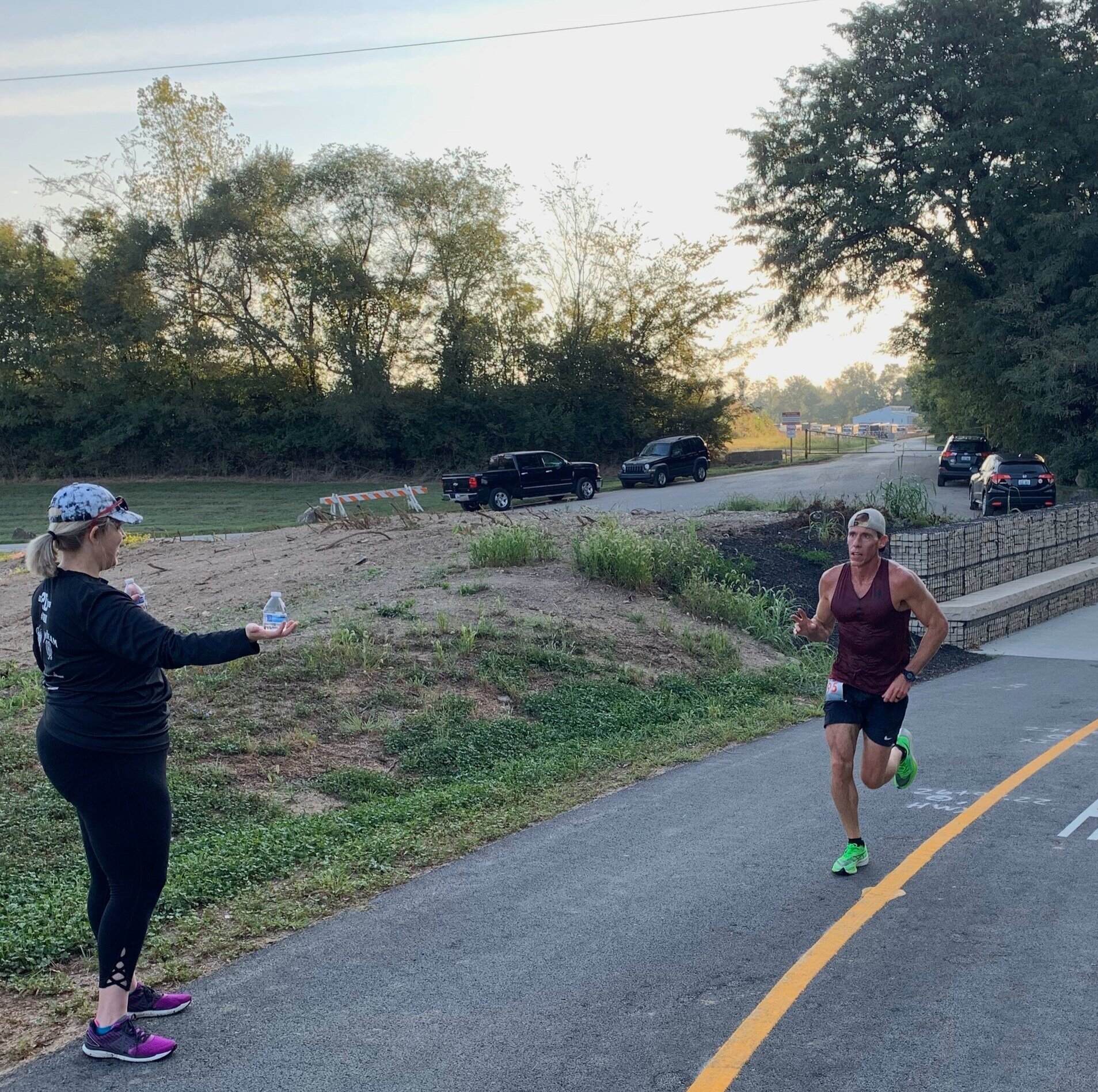Running in the heat
If you’ve exercised outside in Louisville in the past week, something is abundantly clear: summer weather is here. Temps have risen, humidity has crept in, and my shoes are as squishy as ever. Don’t let the heat and humidity keep you from lacing up and pounding the pavement, though. There are numerous benefits to training in the heat. But remember that you’ll need to alter your training to stay safe.
Why does heat affect us while we run? When you run in normal conditions, you need enough oxygen to allow blood to flow to your muscles. But when it’s hot and humid, extra blood flow is needed to cool you off. That extra oxygen needed creates more energy output and a higher heart rate. Our bodies try to cool themselves off by producing sweat, which draws away the heat. As you become dehydrated, that blood becomes thicker, causing dehydration. And when it’s humid outside, your body evaporation rate is lower because the air is already so full of water. We must adjust our training to account for this extra energy output and dehydration.
How do we adjust that training? Here are some tips:
Run early in the morning. By running before the sun rises, you’re beating the heat. It will be more humid, but heat is harder to run through than humidity.
Adjust your pace. If the temperature is over 60°F, you should lower your pace per mile accordingly. Runners Connect provides a great calculator for adjusting your pace according to heat and humidity. It’s much better to run on feel than on pace when it’s hot or humid. If you find yourself overexerting your body at a pace that you could normally run, it’s a good sign that you should slow down and ease off.
Place cold towels and/or ice on your extremities. This is a tip given to me by my coach, Michael Crouch, before the Air Force Marathon in 2018. Temps were expected to exceed 80°F, and most of the race course was on an air force base with no cloud cover or shelter from the heat. By keeping cold towels around my neck, wrapped around my wrists, and a bag of ice under my hat, I was able to keep my body temperature a bit better under control. This was key to me running a 2:55 marathon and finishing in seventh place.
Stay hydrated. Research has shown that drinking 12-16 ounces of cold water before a hot run will lower your body temperature for at least 30 minutes. Then, it’s important to consume 6-8 ounces of water or a sports drink every 15-20 minutes during your run. Don’t wait until you feel like you need to drink water; at that point, it’s too late. When you finish, make sure you continue to replenish your body with the water it needs.
Don’t overhydrate. This is a tip from personal experience, too. At the 2012 Boston Marathon, temps were expected to be among the hottest in the race’s history. This was my first Boston Marathon, and I was in the best shape of my life. But the heat psyched me out, and I wanted to make sure I didn’t succumb to it mid-race. From the onset, I started downing multiple cups of water at every water station. All was going great as I came through the halfway point in under 1:27. But then, my body started to riot. My stomach was churning and my muscles decided it was time to shut down. I was suffering from hyponatremia; my sodium levels were so low because all the water I consumed diluted my sodium levels. The last 10 miles were miserable, even to the point where I had to go into a medic’s tent and get draped in an ice blanket. Somehow I was able to hold it together and walk it in though, but with a finish time of 4:20. What I learned from that day: drink enough water, but not too much.
Dress accordingly. Try to wear sweat-wicking polyester material, avoiding cotton and heavy fabrics. Also, avoid dark colors that are going to absorb the sunshine and make your body even hotter.
Wear sunscreen. When the sun is out and we’re running, especially longer runs, it’s amazing the amount of sun our skin will absorb (watch tan much?). No matter your skin tone, keep your skin safe by applying a sport-level sunscreen enough time before your run that will stay on even through the sweating. Trust me, singlet sunburns aren’t pretty (or comfortable).
Post-Boston Marathon 2012. My shoulders and neck wished I would’ve applied sunscreen.
What tips do you follow when training through heat and humidity? Let’s help each other stay safe as the temps continue to rise in the coming months.


